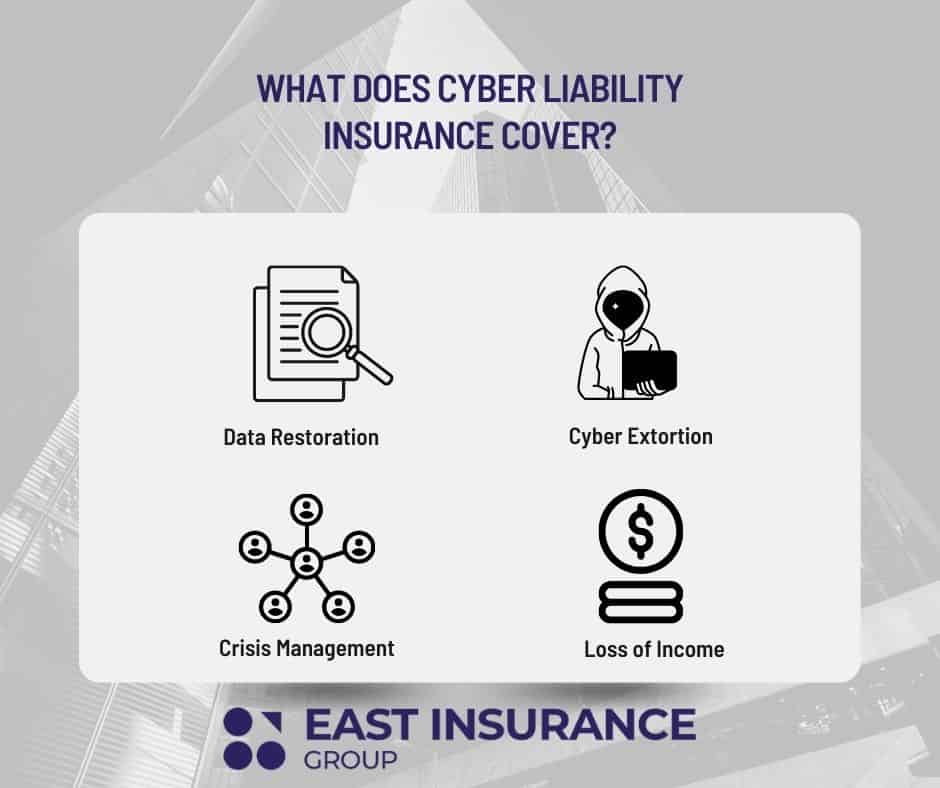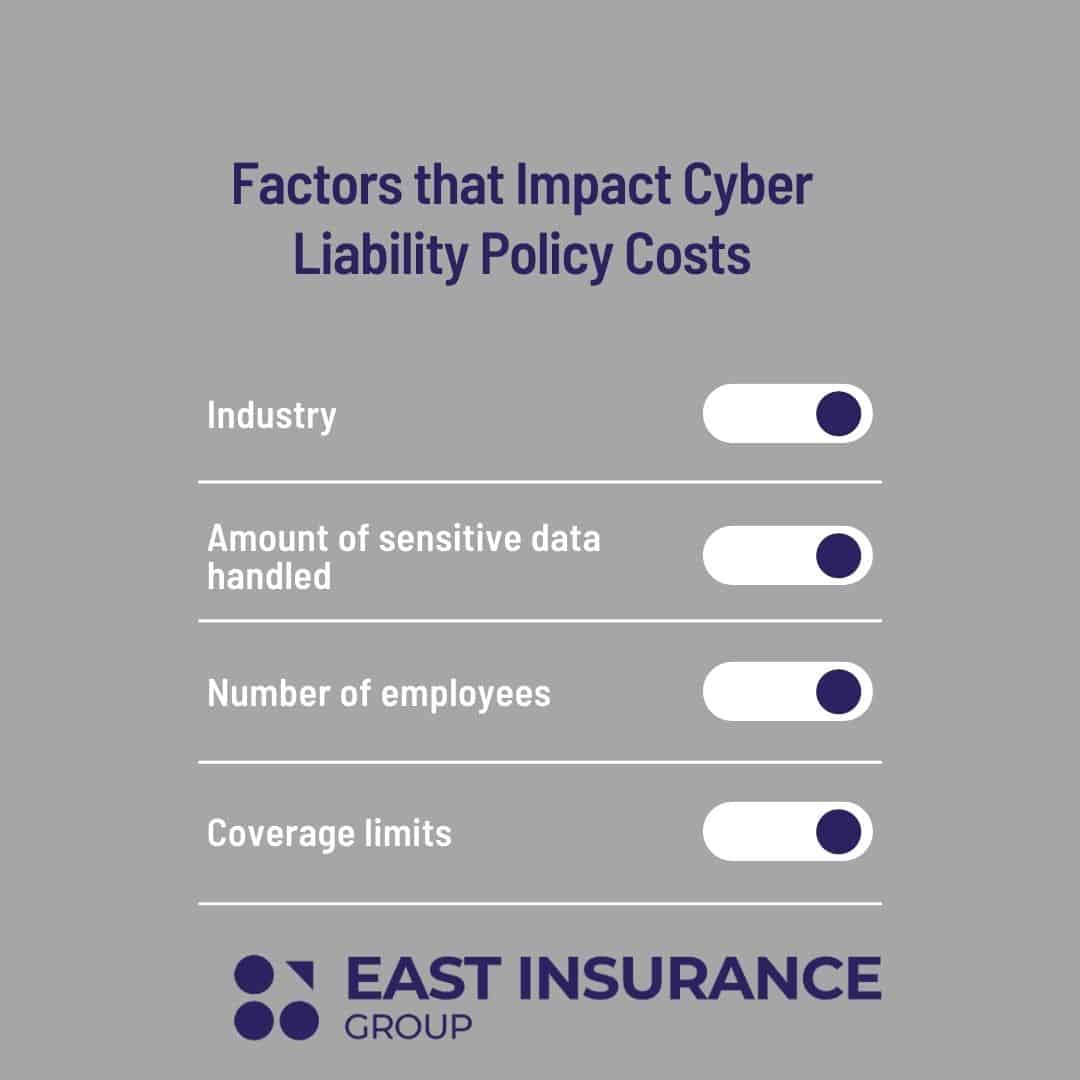Cyber Liability Insurance 101: What is It and Do You Need it?
Today, almost every organization uses computers to send, receive, or store data.
Thousands of essential company documents and databases, including tax records or sales information, can be lost, damaged, or stolen because of a security breach. And the consequences of cyber breaches are usually vast and costly.
This is mainly because data breaches today may also cause third-party claims or lawsuits if they involve personally identifiable information, like health records or social security numbers. That’s why cyber insurance for businesses can be smart, regardless of size.
Here’s what you need to know about cyber liability insurance coverage and how to get the most of it.
If you have questions or want to check the current prices, you can contact us today and get all the information you need fast and free!

What is Cyber Liability Insurance?
Cyber liability insurance is a type of commercial insurance that covers losses that come from cyber events such as data breaches. Most insurance companies offer cyber coverage policies they’ve developed themselves, which is why many different policies exist. However, most cyber business insurance policies include first-party and third-party coverages.
First-party cyber liability insurance covers out-of-pocket fees that a company directly incurs due to a breach. Third-party-coverages, on the other hand, cover damages and settlements that an organization has to pay due to claims or suits for injuries that result from the company’s action or failure to act.
Let’s say a patient sues his doctor for negligence after their treatment records are stolen. They could sue the doctor after the data breach, which could be a big financial hit for the business.
What Are the Four Main Covers Under Cyber Liability?
Because cyberattacks are costly and can take a long time to resolve, cyber liability insurance coverage can help you pay for:
- Mandatory notification of the parties that were affected
- Investigating and fixing security issues
- Loss of business opportunities
- Several years of credit monitoring services for affected customers
What Does Cyber Liability Insurance Cover?

While there are many different policies out there, here are some first-party coverages that are usually included in cyber liability policies:
- Data Restoration: This coverage pays for the costs to replace or restore programs, software, or electronic data damaged or destroyed by a hacker attack or a virus.
- Cyber Extortion: This coverage is useful if a ransom was paid to a hacker who breached the company’s system. Usually, policies cover all extortion payments made with the insurer’s consent along with other expenses such as the cost of hiring an expert to negotiate with the hackers.
- Loss of Income and Extra Fees: This coverage pays for income losses sustained by a business and additional fees incurred to restore its operations after a shutdown caused by a hacker attack, a virus, or some other peril.
- Crisis Management: This coverage pays for crisis management expenses such as paying an attorney, forensic accountant, computer expert, or public relations expert to assess the scope of damage and help restore the loss and protect the company’s reputation.
What Doesn’t Cyber Liability Insurance Cover?
Cyber security insurance usually doesn’t cover:
- Bodily injuries and property damages
- Business reputation damage
- Loss of property
- Lost profits
- Utility failure
Which Type of Cyber Liability Insurance Do You Need?
There are two types of cyber liability coverage:
First-Party Coverage
First-party coverage includes costs that have a direct impact on your business. The coverage is also known as data breach insurance and can usually be added to general liability insurance. It is recommended for retailers and other business owners who work with credit card information.
First-party insurance covers:
- Cyber extortion
- Notifying affected customers
- Hiring experts to investigate breaches
- Crisis management and PR
- Business interruption expenses
Third-Party Coverage
Third-party cyber insurance covers lawsuits against your business by injured parties. The coverage usually includes the costs of legal defense and settlements. This insurance is recommended for tech professionals who could be held responsible for a client’s data breach.
Third-party insurance covers:
- Legal defense costs
- Court costs
- Settlements if you and your client settle out of court
Why Do Small Businesses Need Cyber Liability Insurance?
Just like big organizations, cyber insurance for small businesses can protect them from cyberattacks and expensive data breaches. Also, small companies often have weak cybersecurity, making them great targets for such breaches.
That’s why cyber liability insurance for small businesses isn’t just nice to have. Because cyberattacks can financially destroy any business, cyber insurance coverage can help you recover from financial losses caused by these unfortunate events.
Who Should Carry Cyber Liability Insurance?
If your business handles and stores sensitive and private information, you need cyber insurance coverage. This policy benefits companies that handle credit card numbers, email addresses, phone numbers, and medical information and companies that operate in cybersecurity, work in the cloud, or even esports teams.
Hackers often target retailers, healthcare organizations, and financial service providers. However, remember that any business can be a victim of data breach.
Security breaches, phishing emails, malware, and computer system breakdowns are a few examples of cyber risks that could cause your business serious losses and liability. Cyberattacks happen when cybercriminals try to gain illegal access to data stored on a network or computer to damage or harm a business or person.
One example is the Wawa data breach in 2019, when hackers stole credit and debit card payment information from all 860 stores. Shortly after, hackers placed the payment details for sale on an Internet forum for credit card fraud.
In 2017, Equifax, a consumer credit reporting agency, was attacked by hackers and exposed the personal information of 147 million people. Two years later, Equifax settled with the US Federal Trade Commission. As a part of it, the company had to spend $425 million to provide free credit reporting and cash payments as reimbursement for time or money spent on recovering from identity theft and free identity restoration services.
Another similar situation happened in 2020 when hackers used the Twitter accounts of famous people to send requests for Bitcoin donations to anonymous addresses. They managed to receive more than 400 responses and stole Bitcoin worth $121,000.
What Is the Difference Between Cyber Liability and Data Breach Insurance?
In short, cyber liability insurance covers financial losses from a data breach and provides legal protection. Data breach insurance, on the other hand, only protects the financial interests of an organization.
Data breach policies cover expenses that result from informing affected parties to minimize the damage. This includes offering these parties access to credit monitoring or assistance hotlines.
How Much Does Cyber Liability Insurance Cost?

Cyber insurance coverage costs depend on various factors, such as your policy limits and how much sensitive data your business handles. According to an AdvisorSmith Solution Inc. study, the average cost of a cyber liability policy in 2019 was $1,500 per year for $1 million in coverage.
One of the best ways to get a more affordable policy is to shop around and talk to insurance specialists before making a final decision. However, keep in mind that these factors usually affect the price of your cyber liability policy:
Ransomware, phishing emails, data breaches, and other types of cyberattacks are widespread today, and any company, regardless of its size and industry, can be the next victim.
Because cyber risks are so prevalent, it is always a good idea to think one step ahead and keep your valuable business assets safe. For that reason, cyber liability insurance is something every organization should think about having.
Is Cyber Liability Insurance Expensive?
Cyber liability insurance is one of the more expensive premiums. Besides millions in ransom demands, one of the main reasons is that there is currently an increase in global security threats.
What Is The Difference Between Cyber Liability and Data Breach?
A data breach occurs when you are responsible for losing information, and cyber liability is when an outside party causes a cyber incident. Both cases are costly and can be covered differently in terms of insurance.
Is Cyber Insurance Necessary?
Cybercrime can genuinely concern your business depending on how much you rely on digital content. Considering security is costly to maintain, cyber liability insurance can protect you against cybercrime, from data breaches to different types of website attacks.
Does Professional Liability Cover Cyber?
Generally, professional liability insurance policies contain some type of basic cyber liability coverage. It is a common practice for insurance companies to offer additional cyber coverage to a professional liability policy.
Are you still confused about cyber liability insurance, or do you need some help getting a quote for your business? Contact us today and get all the information you need fast and for free!
Get A Quote And Get Coverage Today
Our Insurance Specialists are ready to help you out.
